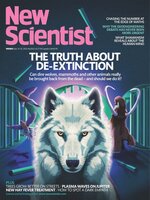New Scientist covers the latest developments in science and technology that will impact your world. New Scientist employs and commissions the best writers in their fields from all over the world. Our editorial team provide cutting-edge news, award-winning features and reports, written in concise and clear language that puts discoveries and advances in the context of everyday life today and in the future.
Elsewhere on New Scientist
Phoney war • The internet is a key battleground between truth and lies about the Ukraine invasion
New Scientist
Ukraine’s nuclear peril • Russian forces have threatened safety at nuclear power plants, but a serious incident is considered unlikely, says Matthew Sparkes
How to fight disinformation • Researchers and fact checkers are debunking a huge amount of online propaganda and fake news about the Russian invasion of Ukraine, reports Chris Stokel-Walker
Why hasn’t Russia waged an all-out cyberwar against Ukraine?
How to ease global food shock • The US and Europe could compensate for the loss of Ukraine’s grain exports by scrapping biofuel mandates, reports Michael Le Page
Clue to the rejuvenating effects of young blood
Even a low level of light at night may disrupt blood sugar
Organic mineral bonanza on Mars • NASA’s Curiosity rover has found more potential signs of ancient life
The slow speed of sound on Mars has been measured
Moon’s emergence from planet crash reconstructed
Double-shadowed craters could hold ice on the moon
Iceland targets herd immunity • The country’s new covid-19 strategy aims for “widespread societal resistance” to the virus, but most experts think this cannot be achieved, reports Clare Wilson
Pink lake mystery solved • DNA sequencing identifies microbes that colour Australian landmark
Crash-avoiding drones can fly in mines
Common toads surprise biologists by climbing trees
A simple maths trick makes training AI more efficient
Extinct species will stay extinct • An effort to reconstruct the genome of the Christmas Island rat suggests we will never be able to resurrect lost animals just as they were, finds Michael Le Page
AI can help historians restore ancient Greek texts
Electric field aids kidneys kept on ice
‘Breathing’ pillow helps reduce anxiety
Really brief
Your organs may age at different rates
Recurring UTIs may be prevented with an antiseptic
Fossil gharial solves crocodile mystery
What’s in a sneeze? • As covid-19 restrictions end, there is a moral duty to adjust our attitudes towards the spread of disease, says Jonathan Goodman
Field notes from space-time • Who is space for? Billionaires fuelling a new space race are having a big say in what happens to the night sky. But space belongs to everyone, writes Chanda Prescod-Weinstein
In the pink
Your letters
Flying into disaster • When we fasten our seatbelts, we put our trust in aviation companies to keep us safe. But what if they are more interested in profit, asks Elle Hunt
Keeping up appearances • Living an online life can be a dream come true, but it is all too often a nightmare, finds Chris Stokel-Walker
Don’t miss
The film column • Reach for the stars We have made a mess of Earth, but does that mean we should head for space and have another go? There are many reasons not to, and not all of them come down to technical difficulties, finds Simon Ings
Wave after wave • By observing dozens of gravitational waves – and spotting completely new kinds – we are solving some of the universe’s deepest puzzles, reports Stuart Clark
OUT OF THIS WORLD
Save our bunnies • A mysterious viral disease is putting rabbits in a...

 Jul 26 2025
Jul 26 2025
 Jul 19 2025
Jul 19 2025
 Jul 12 2025
Jul 12 2025